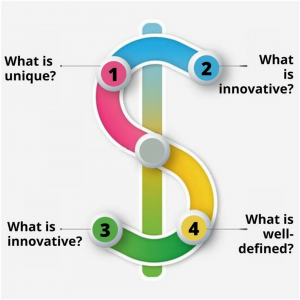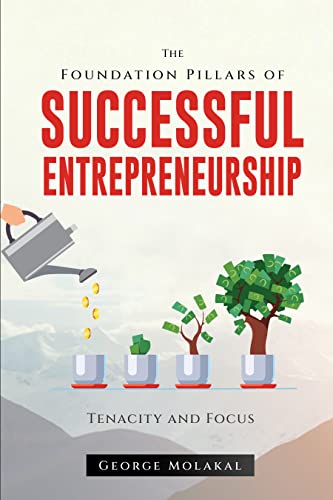Startup Milestones are not just the pathway as most founders consider that needs to follow for success. It’s more like a growth timeline where you tick off those integral startup accomplishments. Here, each startup milestone signifies a giant leap towards a big future venture.
Startup Milestones are ‘tracking marks’ for both Startups and Venture Capitalists. They are crucial for raising the desired funds from VCs. As it defines how much a startup has struck off its key goals to prove its competence to potential investors.
Essentially an investor targets a company that has the least point of riskiness while balancing the opportunity it offers to rate it at an affordable valuation amount. A startup with at least 100 customers is more attractive than one with just a prototype. Thus achieving key startup milestones for an early-stage startup means mitigating risks to a significant extent & increasing the chances of getting funds.
For a startup, each day and month is essential. It is during this initial period that you will get to know about your product and market validity. Now, this might feel a little daunting for a newbie founder to launch their startup, even if you have a groundbreaking idea in your hand. As you go ahead with achieving every milestone, you move forward in every startup stage.
So in this blog, we divided each milestone depending on startup stages. Here we have figured out 15 meaningful startup milestones that are important for your early startup stage:
Seed Funding Milestones
Seed funding is an official start to your equity funding stages. It is the first sum of money that you’ll raise for your startup business. Here are Key Milestones that you need to achieve for your Seed Funding Stages:
Startup Milestone #1:- Releasing First Prototype
A Startup starts with building a prototype design. To launch a startup, you have to show something to people that your idea can have a physical existence. And these critics should have “something” in their hands to get their feedback.
As a fresh founder, you should never underestimate the power of prototyping. It is the life you will give to your groundbreaking idea. Before implementing it on a big scale, it gives a reality check on the strength and weaknesses of the product.
Start with designing it on a piece of paper. With enough flexibility to make any changes, you will get a clear view of your product in front of your eyes. The next step is to digitize your paper-based prototype. This will make your product easily accessible to users for feedback.
Startup Milestone #2:- Minimum Viable Product
MVP is to create a minimum version of your product that still has the capabilities to solve customers’ needs. Now, to erase out your confusion: A Prototype differs from a Minimum Viable Product. Generally, all MVPs are a prototype at their core but far ahead in product development. An MVP is built after you have tested all its hypotheses and assumptions by prototyping to get proof of your idea.
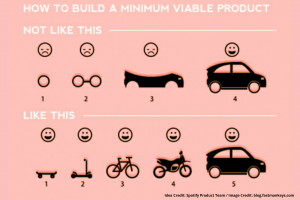
Your MVP should consider vital steps such as research, wireframing, designing, etc while building. Work on integrating your core values and emotions with your MVP design. Maintain consistency in design, voice tone, and product images. This consistency in UI design will define your products’ brand image.
Startup Milestone #3:- Customer Feedbacks
As you got your MVP in your hand, it’s time to give it to your customers. Yes, “Give It,” I said. At the Initial point, instead of selling, give it to relevant customers who have a burning problem & whom you feel will definitely purchase in near future. Allow them to examine the product and take honest feedback.
A founder should always be in close touch with its customer’s needs and wants. These conversations with customers yield a complicated but better list of features that customers need and the product lacks. So before you get distracted with meetings, conferences & dinner, make a habit of talking to users. This startup milestone should be your topmost priority with maximum focus and time.
Once you find out that you are getting similar feedback – you can set yourself to move in that direction. Have efficient systems in place to review their feedback and iterate it to serve them correctly.
Startup Milestone #4:- Market Validation
It is the most crucial startup milestone in a do or dies situation. It will either make or break your startup. This is the startup milestone where you will know whether your product satisfies the market or not.
Ask yourself these questions to determine your product-market fit:
– Is the product exactly what my customers wanted?
– Are the customers satisfied with the product?
– Are the customers repeating?
– Is the market big enough to back the future growth?
Sean Ellis has given out this quick trick of the 40% rule. It says you have achieved product-market fit when out of the total surveyed users at least 40% of them say they cannot do without your product. That’s when you know you have achieved this very integral startup milestone.
Startup Milestone #5:- Profitable Business Model
During a Funding pitch, an investor has a fine eye on the business model. The poor planning and ambiguity of the business model will drop off your chances of getting funded. Planning a profitable business model requires diligence. It is the mapping design of your startup.
Your business model should focus on the following core questions:
– Who are your customers?
– What value do you aim to provide to your customers?
– How will you deliver value to customers?
– How will you be generating your revenue?
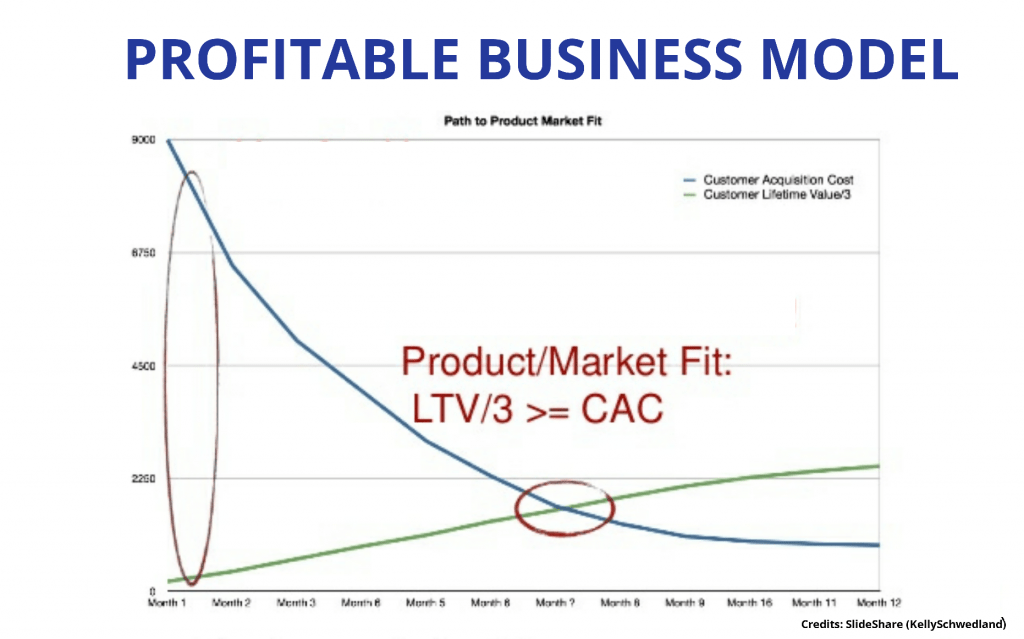
A Business Model reaches profitability when the Lifetime Value (LTV) of customers is three times greater than your Cost of Acquisition (CAC). You can also refer to it as a product-market fit where your customers trust your product and show promising traits to use it for a longer period.
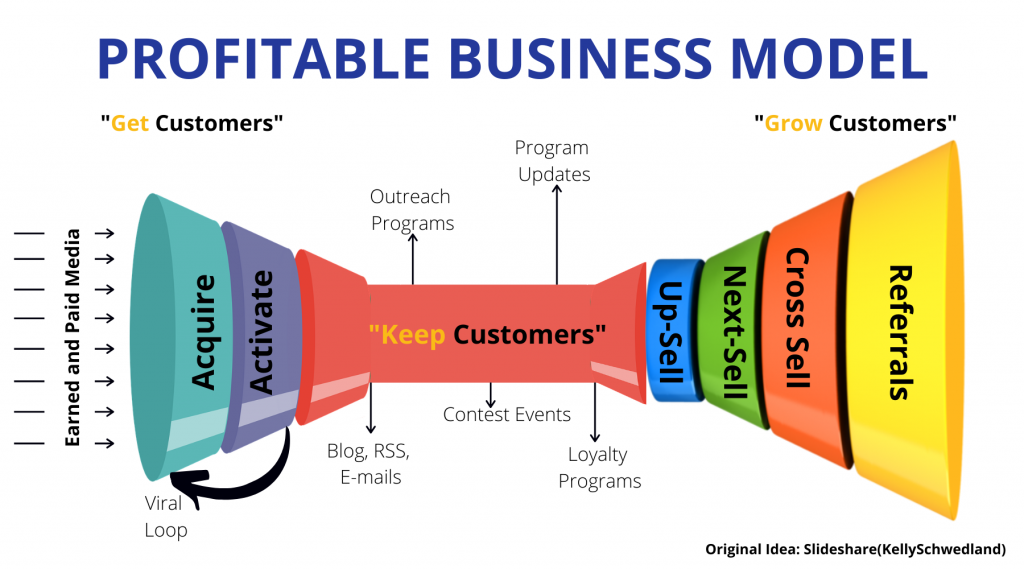
Your Model should have a detailed explanation of your source of revenue. How far you can grow it through a limited customer base. Is it through cross-selling, upselling, or referrals? Or everything at the same time? Because obviously who doesn’t like french fries with Chicken Berger. This is McDonald’s serving your meal to you through their cross-selling strategy. Are you gonna use a similar strategy? If yes, then have a clear view of its process in your business model. An innovation in revenue streams and selling strategy will persuade investors to take the risk with your startup.
Startup Milestone #6:- Paid users
It is at this startup milestone where you can have a small champagne party to celebrate your first PAID User. Finally, you find a customer who pays you for your product. That means, your product has the capability to solve their problem, it provides value to them, and is willing to pay to use your product. Isn’t it a moment to celebrate?
Your first paid user will be the first brick in the domino. Definitely, you’ll have more customers in the future but before that here are few things you need to commit to retain and generate more customers:
– Providing great customer service.
– Nurturing your relationship with customers.
– Be in touch with your customers through content and timely newsletter.
– Keep a track of daily and monthly sales growth.
Generate a sales trend where you can project $1 million annual revenue to your investors to prove your existence in the market. But before that don’t move your eye from your first 10, 100, 1k, and 10k customers.
Startup Milestone #7:- Repeat Customers
This is not a great milestone but still a meaningful one to be considered in this startup milestone list. Even a single repeat customer can set a line for more repeat customers. It may not be that great for you, but it can definitely give you the confidence to generate more business through a limited number of customers.
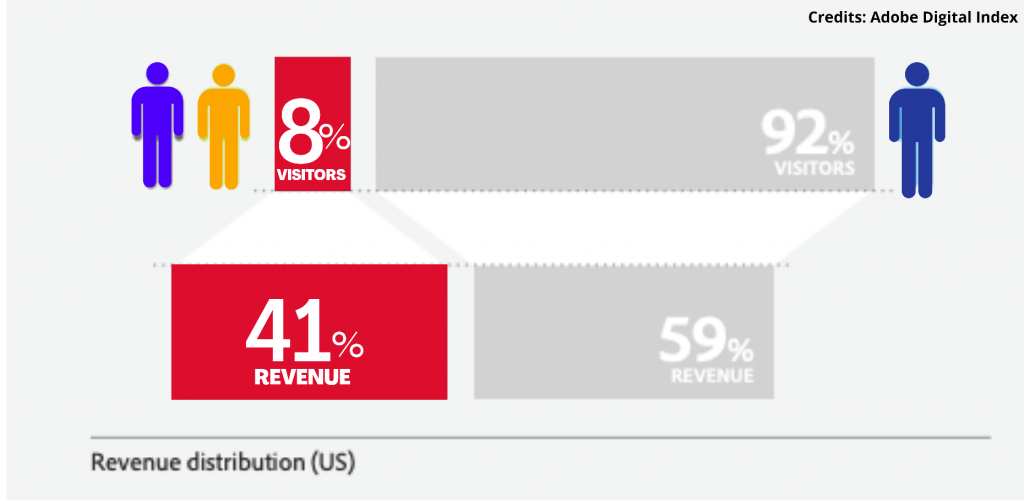
Repeat Customers are really “Blessings” in business. As most of the e-commerce stores earn 41% of revenue through their 8% of customers and this 8% are repeat customers. That’s how profitable a repeat customer is !!!
Thus, retaining the existing customers and nurturing them will pay you off in the long term as 5% of retention will increase profitability by 75%.
Seed A Funding Milestones
As you develop a successful and established user base, earn consistent revenue figures, and accomplish the above milestones, you are all set to raise Series A Funding capital. These are the key milestones that you need to achieve once you raise Series A funding capital:
Startup Milestone #8:- First Hire
Some people may not even consider this as a startup milestone. In fact, few think this to be a nominal activity in any business. Yes, that’s right !!!. But ain’t you a newbie founder and you have just begun to grind? You can go with being a “solopreneur” if you’ve got a small budget. But to go far and to build a venture a team is important.
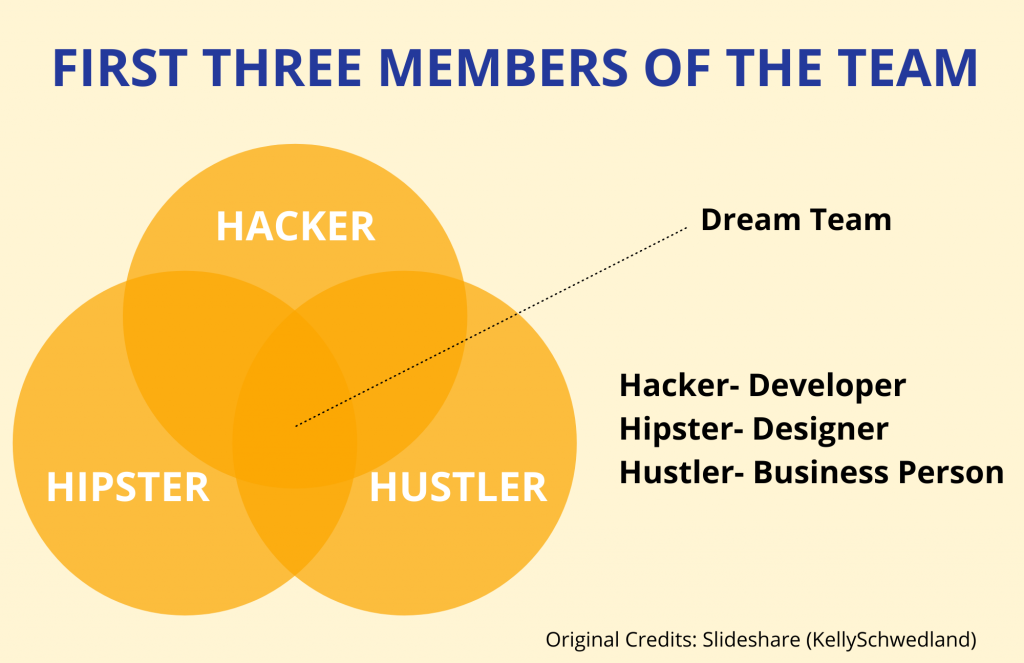
Here are the Five universal rules that an early-stage startup should follow:
#1st Rule: Always Start with the positions which are extremely important & necessary for the company.
#2nd Rule: Focus on creating a small team with distinct management skills: Technology (Developer), Process (Designer) & People (Businesspeople).
#3rd Rule: Hire individuals only for functional roles in your company. Curb the desire of hiring C-Level executives at the initial stages of the startup.
#4th Rule: Have diversity in the team in terms of network, experience & skills & who expand your capabilities instead of increasing what your current team has.
#5th Rule: The Final one, recruit individuals with a thirst for success and are ready to thrive even at limited resources.
Your first hire will be as important in your startup as you. It will either bring lots of success or lots of disturbance to the startup. Take out enough time and plan out for strategic hiring because every individual you hire will have a broad impact on the startup.
Startup Milestone #9:- Scalable Marketing Strategy
No one knows about you & your idea. You have to make your startup heard. Marketing will bring your startup in front of the customers. It is the lifeblood of every business.
With the digitization era, make the best use of online marketing. Build email lists of interested consumers through content marketing. Take advantage of your networks, participate in startup competitions (even if you don’t win here, you’ll definitely get free marketing here).
Create a scalable marketing strategy where the effects are easily amplified without any additional marketing costs. While creating a marketing strategy have your budget in mind, as most businesses make this common mistake of spending huge money just to receive insignificant results at the end.
Startup Milestone #10:- Revenue Development
Product development is naturally every startup’s priority. But what takes the backseat while doing this is Revenue Development. Pricing of the product that appreciates your product’s worth is as important as the product design.
Revenue Development is a continuous activity to iterate the revenue model of the company. Here are these key questions you should answer to decide your Revenue Model:
– Does the target customer have the ability and are capable enough to pay?
– How much is their willingness to pay for the product?
– How do you aim to plan the pricing of your product or service? Is it one-time purchasing, recurring purchase, subscription-based, etc.?
– What should be the price or price range of it?
– Can you build a sustainable business based on this pricing?
– Do you have future pricing strategies for new market segments?
To start with, the Business Model iteration along with Pricing iteration are the two main aspects of it. Tweaking your business model based on market and consumer requirements will give you a better pathway to price the product accordingly. As you have validated your product through product-market fit, revenue development is to validate the willingness and the ability of customers to pay.
Startup Milestone #11:- First Venture Capital Funding
Startup Geeks says, “Fundraising is not a Startup Milestone.” It can be right but I still have a different perspective on this. A startup’s first venture capital funding round is the Milestone but not the second one. Because raising funds is not a cakewalk. There are lots of things like having quantitative metrics in place, an established business model, significant team experience, etc that go backstage to get Venture Capital Funding. Why not consider this to be a startup milestone?
Inarguably, many firms win at the seed round, while just based on MVP. It’s a long repetitive ending process so for an early startup their first VC funding is definitely a Milestone. Check out our blog A Step By Step Illustration of Startup Funding Stages to get a clear view of the different funding stages a startup goes through.
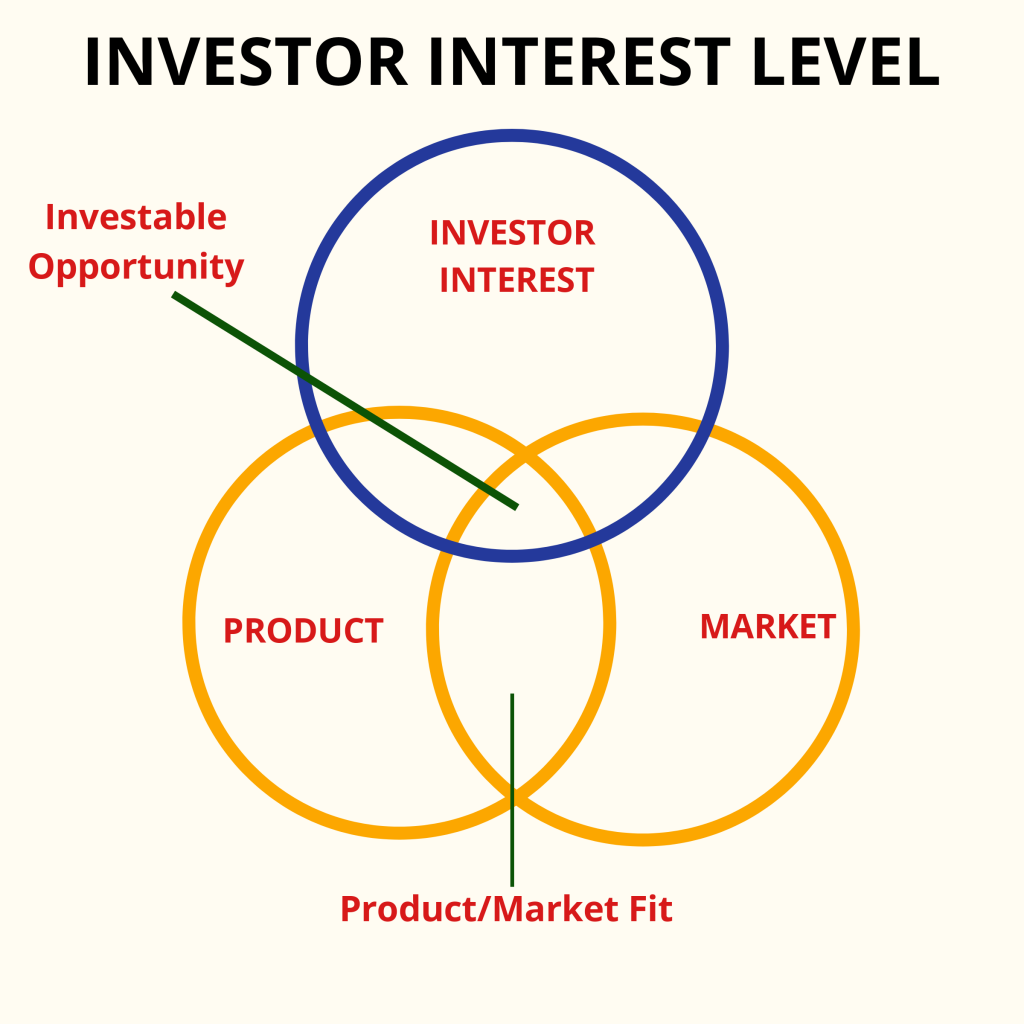
Your funding rounds should be enough for you to give a runway of 12-18 months. And these months should be a period of extreme hustle to have quantitative accomplishments on your side. Thus, to make your startup ready for the next funding round.
Venture Capital Funding Milestones
As you flourish and plan to expand your business Venture capital is the way through which you can do this. Here are the key Milestones that you need to achieve after securing your Venture Funding:
Startup Milestone #12:- Product Redevelopment
No one can anticipate what a market “really” needs. Every founder comes at a point where the redesign and pivot of the product arises. It will require you to restate the entire venture and redefine the new market opportunities.
It’s a phase where founders reexamine their previous assumptions about financing, market size, demographic, pricing, target market, etc. They find out the gap between what they are offering and what the market needs & pivots it to make a profitable business.
As you pivot, stick yourself to the same vertical and leverage your industry knowledge to effectively pivot your business. Have clear communication with your team members so they shouldn’t be left behind as you make your pivot plans.
Startup Milestone #13:- Gaining Market Authority
With great competition already existing in the market, it’s tough to have a breakthrough and gain market authority. To be a market authority it’s not about being a one and only expert. You should have more focus on the consistent growth and expansion of the company. Just like Amazon. Amazon worked on the consistent growth and developments in the business while tapping the underutilized markets. Thus, making it a global leader in the e-commerce industry.
Have strategies that set you apart from your competitors & make you easily distinguishable in the niche market. Feed your customers in a way that was never known to them. Leverage your only strategies to market your startup to customers and investors.
Startup Milestone #14:- Positive Cash Flow
Positive Cash Flows are when your cash inflows are higher than the company’s outflow of cash. It may not necessarily imply that you are earning profits. Positive Cash flows are a sign of good revenue and expenditure management. It shows a good increase in liquid assets, thus enabling reinvestment in the business, payment to shareholders, and even some buffer for unforeseen financial challenges.
The more cash flow you have the greater are the chances of having a sustainable business in the competitive market. This startup milestone is of great advantage for enabling business expansion while maintaining independence.
Some of the best methods to achieve a positive rating in cash flow are: Collecting receivable payments, increasing cash sales, improving credit rating by investing in cash reserves and managing debts, securing loans for short term for daily overheard payments, etc.
Startup Milestone #15:- Igniting Entrepreneurial Spirit
This was all about your “startup” milestones. So now comes the “you” of the startup. It’s your idea, your strategies, and your startup. So with all this, comes the need of igniting your inner spirit of entrepreneurship. Because after all, it is you who wants to grind to build a startup from your idea.
An entrepreneur’s capabilities have a lot to do with the success of the new business. Out of all the common reasons for startup failures, one thing that is being ignored is the person who is at the center of the company. An entrepreneur should have the capability to sell their idea and build their dreams.
Just has an investor have an eye on your startup business, they are keen to know your passion. It should reflect in your conversations and your pitch desks in front of the investor’s panel. They know it’s difficult so they yearn to know how smartly you can find your way out.
To Wrap Up:
Startup Milestones are all about moving from one challenge to another. There will be days when you don’t know where you are going. So above all this, know your motto of “Why I want to do this?”. This is what will keep you ahead in the market a long way.
Review each milestone to plan for your future decisions. Every startup will have its own set of milestones. Every milestone that is achieved is a stepping stone to success. So celebrate and tap your back for every milestone but remain grounded for the next milestone. Because launching a startup is a long marathon and not a sprint. And you aim to win it !!!




